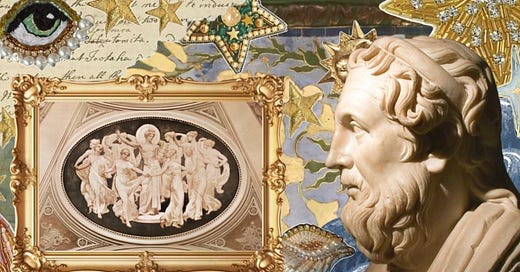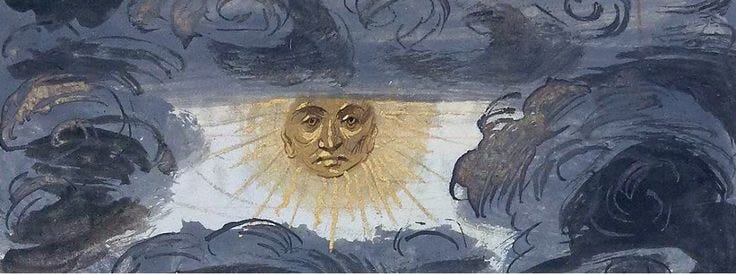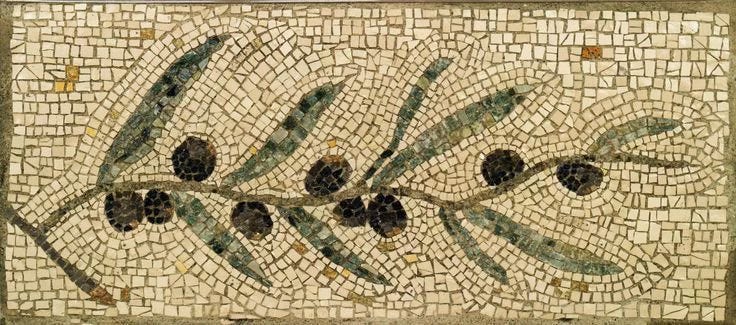The Odyssey: Or, How to Lie So Well They Canonise It
On narrative gaslighting, Homeric chaos, and why Odysseus is the original master of mythic misdirection.
You know that guy who tells a three-hour story at a dinner party and somehow makes himself the hero, the victim, and the main character even when you know he caused the chaos? That’s Odysseus. Except instead of being ghosted by a group chat, he’s canonised in the Western literary tradition.
We don’t call him a liar. We call him cunning. We call him polytropos, “of many turns,” but let’s be honest: the turns aren’t just geographical. They’re narrative. He tells his story the way most people tell bad breakups: retrospectively, selectively, and with just enough divine interference to avoid blame.
The Odyssey isn’t told in order. It’s told in survival mode
What We Hear (Narrative Order)
The poem opens not with Odysseus, but with his absence. Telemachus is drifting, the suitors are freeloading, and the gods are busy debating whether or not to intervene. By the time we actually see Odysseus, he’s sobbing on a beach. A literal island exile with commitment issues. And yet, somehow, he’s still the narrative anchor.
Once he reaches the Phaeacians, he launches into four books of flashback. It’s TED Talk meets fever dream. Cyclopes! Cannibals! Talking ghosts! Every detail is emotionally curated. He is brave. He is suffering. He tried everything. The gods were unfair. The crew? Stupid and doomed. And the women? Well, they all wanted him. Even the enchantresses. Especially the enchantresses.
It’s persuasive. It’s moving. It’s the kind of story that wins wars and gets you home.
(Need a mythic cheat sheet? Glossary below. Because sometimes survival requires context, and so does a 12,000-line poem.)
What Actually Happened (Chronological Order)
In real time, Odysseus leaves Troy and immediately raids a city for no reason. He and his men get high, poke a Cyclops in the eye, ignore repeated instructions, eat divine cattle, and die—almost all of them. He then spends seven years doing nothing but crying on a beach and sleeping with a goddess. When he finally moves, it’s thanks to Athena pulling strings behind the scenes like the divine PR manager she is.
The real story isn’t tidy. It’s full of loss, poor decisions, and a man very lucky to be liked by gods. The timeline reads less like an epic and more like a long, spiralling failure with moments of grace.
And yet, Homer doesn’t tell it that way.
The Blueprint for the Hot Mess Era
Odysseus didn’t just survive. He branded it. He soft-launched his trauma across multiple islands, stayed silent for seven years (to build mystique), and then reappeared shirtless, shipwrecked, and ready to narrate. If he existed today, he’d be selling a journaling course called Mythic Misdirection for Modern Living, co-sponsored by a protein bar and a boutique oracle subscription.
He would absolutely have a newsletter. It would be called Wine-Dark Weekly. There’d be one paid tier. The tagline would be “for those who’ve wept on beaches.” Guest essay by Circe. Bonus content: how to pivot out of a hostage situation with charm and a tragic backstory.
Because Odysseus doesn’t spiral. He restructures. Every disaster becomes an anecdote. Every mistake becomes a motif. Every divine consequence? A plot point. This isn’t emotional stability; it’s narrative control. And somehow, it works.
He’s not just a survivor. He’s the blueprint. Every modern anti-hero owes him royalties. Every memoir that omits the worst year of someone’s life? Odyssean. Every girl posting an ambiguous black-and-white caption after ghosting three friends and quitting her job? Epic-coded. You can roll your eyes, but the algorithm rewards a good story. And Odysseus told it first.
So… Why Canonise It?
Because Odysseus isn’t just a man. He’s a myth in the making. He tells his story, then becomes it. Homer doesn’t just give us a tale of return; he gives us a study in narrative control. Odysseus rewrites his past before he’s even made it home. The man performs grief, reinvents himself mid-verse, and wraps up ten years of recklessness as if they were noble tests of fate. And we let him.
We read, we believe, we cite it in essays. Because somewhere between the divine councils and the beggar disguise and the emotionally loaded bow contest, we forget what this really is.
The Odyssey isn’t just about cleverness. It is cleverness. It’s what cleverness looks like when it’s weaponised for survival. Odysseus doesn’t win through force; he wins through narrative. He constructs a version of events that casts him as the tragic hero of a story only he can tell. He delivers it with charisma, structure, and just enough self-awareness to avoid scrutiny.
Myth as Damage Control
The Odyssey isn’t really a story. It’s an alibi with meter.
It reads like the most effective PR campaign in literary history: carefully paced, emotionally structured, and rich in plausible deniability. If Achilles was all rage and raw consequence, Odysseus is what happens when spin wins. The man doesn’t confess. He curates.
He arrives shipwrecked and strategically mysterious. He doesn’t say, “Everyone I loved is dead, and most of it was my fault.” He says, “Let me start from the middle and tell you about the time I heroically escaped a man-eating giant, but make it tragic.” He doesn’t lie—not exactly. He reframes. He edits. He holds eye contact. He makes you complicit.
That’s not just poetry. That’s damage control.
And Homer knows it. The poem doesn’t just celebrate Odysseus; it lets him get away with it. The gods nod along. The audience cries. Penelope takes him back. By the end, the man has killed an entire room of suitors, traumatised his household, and reunited with his wife using a metaphor about furniture, and somehow we’re still rooting for him.
It’s the ancient equivalent of coming back from a scandal with a rebrand and a three-part redemption arc. You don’t need to be right. You just need to be narratively coherent. And that’s what Odysseus mastered: not heroism. Plausibility.
Strategic Storytelling Isn’t a Trend. It’s a Tradition.
This isn’t new behaviour. It’s foundational. The Odyssey is one of the earliest Western texts to show that narration isn’t just a medium; it’s a tactic. It anticipates the unreliable narrator centuries before modernism gives us Holden Caulfield, or postmodernism gives us narrators who withhold more than they reveal. It uses selective memory long before autofiction brands it. It tells a story inside a story inside a myth, while pretending it’s all just a retelling.
Homer isn’t fooled by Odysseus. He’s enabling him. This is a poet who knows exactly how performance, power, and poetry blur. As classicist Barbara Graziosi notes, the poem “is not simply about Odysseus’ adventures, but about how stories get told—and who gets to tell them.” Homer opens The Odyssey with the Muses, the arbiters of voice and memory. He starts by reminding us: no narrative is neutral.
That self-aware chaos has echoed across time. You can see The Odyssey’s influence in modern literature’s obsession with disjointed timelines and mythologised subjectivity. Writers like Rachel Cusk and Ben Lerner build entire careers on narrators who withhold, distort, and reframe. Ottessa Moshfegh’s protagonists are Odyssean in their curated self-destruction. You can see it in how modern authors sculpt perception; distortion becomes depth, omission becomes voice. The line between storyteller and story collapses.
And online? Odysseus is everywhere. We’re all narrating ourselves into coherence. Cutting our own flashbacks. Delivering our own Phaeacian monologues in newsletters, captions, and Notes app essays. We curate our chaos. We leave things out. We build legibility after the fact.
So no, Odysseus isn’t lying. He’s surviving. He’s trying to get home in the only way he knows how: by becoming unforgettable. By speaking first, loudest, longest. By giving you the best version of the worst decade of his life and calling it meaning.
And Homer frames it—deliberately, masterfully—not to expose him, but to show us how narrative works. This isn’t a poem about truth. It’s a poem about telling. About what gets remembered. About how legacy is built not on accuracy, but on authorship.
It’s not a flaw. It’s not deception. It’s the construction of self in a world that forgets the silent. That’s the myth. That’s the brilliance.
And if you’re smart, you’ll do the same
Glossary (for those new to the chaos): The Wine-Dark Who’s Who
Odysseus – War hero, weaver of lies, mythic strategist. Fought at Troy, spent ten years failing to get home. Still got canonised.
Telemachus – His angsty, slightly lost son. Spends the first half of the poem looking for a dad and a personality.
Penelope – His wife. Smarter than all the men in the room. Holds the kingdom and her marriage together with textile-based emotional manipulation.
Athena – Goddess of wisdom, war, and narrative clean-up. Odysseus’ divine hype woman and occasional crisis manager.
Suitors – A hundred-plus freeloaders trying to marry Penelope while Odysseus is MIA. Spoiler: most of them end up very dead.
Phaeacians – Soft, sea-loving islanders who give Odysseus a platform (and a boat). The TED Talk crowd.
Cyclopes – One-eyed giants. Famously unfriendly. Odysseus stabs one in the eye and it all goes downhill from there.
Circe – Witch-goddess who turns men into pigs. Sleeps with Odysseus for a year and sends him to the Underworld. Feminine chaos embodied.
Calypso – Immortal nymph who keeps Odysseus on her island for seven years. Offers him eternal life; he chooses nostalgia.
The Muses – Goddesses of memory and storytelling. Homer invokes them at the start, reminding us who really controls the narrative.
“Polytropos” – Epithet for Odysseus. Literally “many-turned.” Think: versatile, cunning, messy in a poetic way.










This was so fun and easy to read, but really informative nonetheless; really love your style!🫶
A really great read, it's been a while since I got hooked into reading something so freely and enjoying it really well, thanks for making my day a little bit better than before.